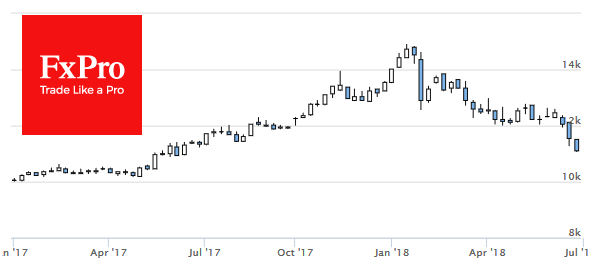Chinese bourses falling for the third week in a row and touching in early July levels last seen almost year ago. The recent impulse occurred after U.S. imposed duties on Chinese goods with a capacity of $50 Bln, and soon promised to expand them to $200 Bln. During this time, China’s largest companies have lost more than 10% of their capitalization, according to the FTSE China A50 Futures Index, which sagged by 12%.
In total for 2017 the turnover of China and the U.S. made about $600 Bln., and investors are worried about the development of this situation. As long as politicians cannot find a common ground, the business community loses confidence, which is reflected in the results of the recent surveys. In the United States, they show a surge in inflationary expectations, and in China and Japan there were drop in the export orders and anxiety around future prospects.
What is noteworthy, the fall of the Chinese stock markets is taking place against the backdrop of the sharpest weakening of the yuan in recent years. Often the depreciation of the national currency is regarded as assistance to exporters. However, the markets believe that the 5%-yuan correction is not enough to compensate for the losses from the tariffs.
It is likely that the weakening of the Chinese yuan simultaneously with the country’s stock markets will continue until we hear changes in rhetoric from at least one of the parties to the conflict.

